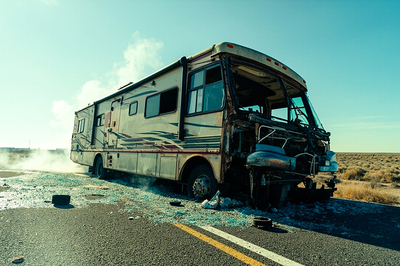Camper Crash 101: What Every RV Owner Should Do After an Accident
This guide walks you through clear, calm steps to handle an RV or camper accident emergency. Stay focused, take a deep breath, and follow these steps to protect yourself and your passengers.
Ensure Immediate Safety
Move to a Safe Area
If your RV or camper is drivable and you’re in a dangerous spot, carefully steer to the shoulder or a safe area out of traffic. Turn on your hazard flashers to alert other drivers. Avoid sudden movements when pulling over, and stay as calm as possible to keep control of your vehicle.
Check for Injuries
Once stopped, check yourself and passengers for injuries right away. If anyone is hurt, do not move them; call 911 immediately for medical help. Even if injuries seem minor, it’s wise to have medical professionals assess the situation. Safety is the top priority.
Watch for Fire or Hazards
RV accidents can involve unique dangers. Many RVs are equipped with propane tanks for use with appliances. Each year, from 2018 to 2020, an estimated average of 4,200 recreational vehicle (RV) fires were reported to fire departments within the U.S. So if you smell gas or suspect a propane leak, turn off the propane supply if you can do so safely. Extinguish any flames and do not smoke. A leaking propane tank or fuel line is a fire risk, so creating distance and avoiding sparks is critical. Keep a fire extinguisher handy, as most RVs carry one as part of basic safety equipment.
Call 911 and Law Enforcement
Contact Emergency Services
Even for a minor accident, call 911 so police and first responders can come to help. Tell the dispatcher your location and any known injuries. The police will create an official accident report, which can be crucial for insurance claims. If you’re unfamiliar with the kinds of traffic and accident codes that might be cited in a report, you can review a list of common accident codes used by law enforcement to better understand the terminology Stay on the line if the operator needs more information. If you’re unable to call yourself, ask someone nearby to call for you.
Follow Instructions
The emergency operator might give you guidance on immediate actions. For example, they may instruct you on how to help an injured person or secure the area. Listen carefully and follow their directions. Help is on the way.
Stay Visible and Safe
While waiting for police and medical help, make sure your accident scene is as visible as possible to other drivers to prevent further collisions. Use reflective triangles or road flares from your RV emergency kit if you have them. Put them on the road at a safe distance behind your RV to warn oncoming traffic. If it’s dark, use flashlights or hazard lights.
Exchange Information and Document the Scene
After addressing any injuries and calling for help, start gathering important information about the accident.
Exchange Info with Others
If another vehicle is involved, exchange contact and insurance information with the other driver once it’s safe. This includes names, phone numbers, addresses, insurance company, policy number, driver’s license numbers, and license plate numbers. Be polite and cooperative. Do not discuss faults or make accusations, and stick to factual information exchange only.
Take Photos and Notes
Use your phone or camera to take clear pictures of the scene. Get wide shots of the entire accident scene and close-ups of damage to your camper and any other vehicles. Include photos of skid marks, road conditions, and any traffic signs or signals nearby. If you or others have visible injuries, photograph those too for documentation.
Talk to Witnesses
If there were any witnesses, get their names and contact information as well. A neutral third-party account of what happened can be invaluable later. Ask if they would mind briefly describing what they saw, and jot down notes or record their statements.
Notify Your Insurance Provider
Once the immediate crisis is under control and you have collected basic information, report the accident to your insurance company promptly. Most RV insurance policies require timely notification of accidents.
Call Your Insurer
While you’re still at the scene, call the claims phone number on your insurance card. Many insurers have 24/7 claim hotlines. Provide them with the facts of what happened. They will likely ask for the police report number and details of all vehicles and drivers involved. Refer to the notes and photos you collected so you can give accurate information.
Ask About Next Steps
Follow any instructions from your insurance adjuster. They may arrange a tow truck if your camper is not drivable, or they might direct you to get an estimate for repairs. Do not authorize any major repairs on your RV until your insurance company has evaluated the damage, unless it’s an emergency repair to prevent further harm.
Understand Your Coverage
An RV accident can be an eye-opener about insurance coverage. As you work with your insurer, take note of what is and isn’t covered. RVs often have special considerations – for example, coverage for personal belongings inside, or attached accessories like awnings. Make sure to mention any such damage when filing the claim. If you discover gaps in your coverage, consider reviewing and updating your policy after the accident is resolved.



